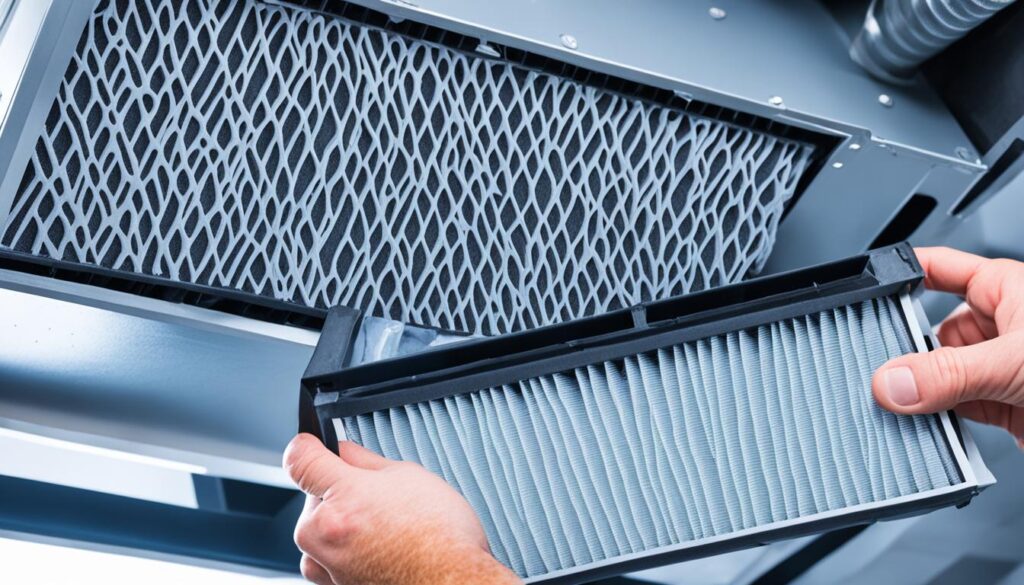Did you know that HVAC systems account for about 48% of a typical household’s energy consumption? That’s almost half of your energy bill! Optimizing the performance of your HVAC system is not only essential for creating a comfortable living environment but also for increasing energy efficiency and saving on costs. In this article, we will explore various strategies to help you improve HVAC efficiency and make your HVAC system work better.
Key Takeaways:
- Understanding HVAC and energy efficiency ratings can help you choose an energy-efficient system.
- Regular maintenance, including inspections and filter replacement, ensures optimal performance.
- Technological improvements, such as smart thermostats, can enhance energy savings.
- Improving insulation and sealing prevents energy loss and improves overall efficiency.
- Proper HVAC sizing and duct design maximize airflow and performance.
Understanding HVAC and Energy Efficiency
Energy efficiency is crucial when it comes to HVAC systems, as they can account for a significant portion of your energy costs. Understanding the different ratings used to measure energy efficiency is essential. These include the Seasonal Energy Efficiency Ratio (SEER), Energy Efficiency Ratio (EER), and Heating Seasonal Performance Factor (HSPF). The higher the rating, the more energy efficient the HVAC system is. By choosing an energy-efficient HVAC system with a high rating, you can reduce energy consumption and save on utility bills.
| Rating | Description |
|---|---|
| SEER | Seasonal Energy Efficiency Ratio |
| EER | Energy Efficiency Ratio |
| HSPF | Heating Seasonal Performance Factor |
Optimizing HVAC Functionality through Maintenance
Regular maintenance is key to keeping your HVAC system running efficiently. By performing routine maintenance tasks, you can ensure that your HVAC system operates at its best, maximizing efficiency and preventing costly repairs.
Scheduling regular inspections and cleanings is essential for the optimization of your HVAC system. During professional inspections, HVAC experts can identify and address any issues before they become major problems. Cleanings are also important as they help remove dust and debris that can accumulate within the system, leading to reduced efficiency and decreased performance.
One critical maintenance task that should not be overlooked is air filter replacement. Air filters play a crucial role in maintaining good indoor air quality and preventing dust and debris from entering the HVAC system. Over time, air filters can become clogged and dirty, hindering proper airflow and straining the system. Regularly replacing air filters ensures optimal performance and improves energy efficiency.
Performing these maintenance tasks on a regular basis will help extend the lifespan of your HVAC system and maintain its efficiency. By investing in HVAC maintenance, you can save on energy costs and enjoy a comfortable living environment.
| Maintenance Task | Frequency |
|---|---|
| Inspections and Cleanings | Once a year |
| Air Filter Replacement | Every 1-3 months |
Technological Improvements for Your HVAC System
One of the most effective ways to enhance the efficiency of your HVAC system is by incorporating technological improvements. Upgrading to a smart thermostat or programmable controls can significantly optimize energy usage and save on energy costs.
A smart thermostat is a cutting-edge device that allows you to automate temperature adjustments based on your schedule. By conveniently controlling your HVAC system through your smartphone or computer, you can ensure that it is not running unnecessarily when you are not at home. Smart thermostats can learn your preferences over time, adapting to your behavior and further optimizing energy usage. With features such as geofencing and occupancy sensing, smart thermostats intelligently adjust temperature settings, providing comfort while minimizing energy waste.
Programmable controls are another technological advancement that can improve the efficiency of your HVAC system. With programmable controls, you can preset temperature settings for different times of the day or week, ensuring that your HVAC system operates at optimal levels when needed. For example, you can set the temperature to be slightly higher or lower during working hours or while you are asleep, allowing for energy savings without sacrificing comfort.
By leveraging these technological improvements in your HVAC system, you can achieve significant energy savings. The ability to automate temperature adjustments and customize settings based on your lifestyle not only enhances comfort but also ensures that your system operates efficiently, reducing unnecessary energy consumption.
The table below summarizes the benefits of smart thermostats and programmable controls:
| Smart Thermostats | Programmable Controls |
|---|---|
| Automate temperature adjustments | Preset temperature settings for different times |
| Customize settings based on preferences | Energy savings without sacrificing comfort |
| Learn your behavior and adapt over time | Optimize HVAC system operation |
As demonstrated in the table, both smart thermostats and programmable controls offer unique benefits that contribute to energy efficiency. Whether you choose a smart thermostat or programmable controls, incorporating these technological improvements into your HVAC system can make a significant impact on your energy savings.
Insulation and Sealing: A Key to Efficiency
Proper insulation and sealing play a crucial role in maximizing the efficiency of your HVAC system. By effectively insulating your home, including the ductwork, you can prevent air from escaping and reduce the workload on your HVAC system. This helps to maintain a consistent temperature throughout your home and prevents unnecessary energy waste.
Sealing any air leaks in the ductwork is also essential for preventing energy loss and ensuring that conditioned air reaches its intended destination. Leaky ducts can result in the loss of heated or cooled air, leading to a less comfortable living environment and increased energy consumption. By taking measures to seal these leaks, you can optimize the performance of your HVAC system and minimize energy waste.
Improving insulation and sealing not only enhances the energy efficiency of your HVAC system but also creates a more comfortable and environmentally friendly home. By minimizing air leakage and heat transfer, you can reduce your reliance on heating and cooling systems, leading to potential energy savings and a lower carbon footprint.
When it comes to home insulation, it is important to consider both the quality and quantity of insulation materials used. Properly installed insulation in walls, attics, basements, and crawl spaces can significantly reduce heat transfer and improve overall energy efficiency.
Additionally, duct sealing involves identifying and repairing any gaps, cracks, or loose connections in your ductwork. This can be done using materials such as mastic sealant or metal tape to create an airtight seal, preventing air from escaping and maximizing the effectiveness of your HVAC system.
Consulting with a professional HVAC contractor can help ensure that your home is properly insulated and that any air leaks in your ductwork are effectively sealed. They can assess your current insulation and duct sealing levels and recommend any necessary improvements to optimize the energy efficiency of your HVAC system.
| Benefits of Proper Insulation and Sealing | Duct Sealing Process |
|---|---|
|
|
Proper HVAC Sizing and Duct Design
Proper HVAC sizing and duct design are crucial factors in achieving optimal airflow and efficiency in your HVAC system. When it comes to HVAC sizing, it’s essential to ensure that the system is neither too large nor too small for your space. An oversized HVAC system may lead to inefficiencies and increased energy consumption, as it will cycle on and off frequently, while an undersized system may struggle to adequately heat or cool your home, resulting in discomfort.
Additionally, the design of your ductwork plays a significant role in the airflow and performance of your HVAC system. Improperly designed ductwork can lead to airflow restrictions, causing certain areas of your home to be poorly heated or cooled. This can result in an imbalance in temperature throughout your living space, making your HVAC system work harder than necessary.
Consulting with a professional HVAC technician is crucial to ensure that your HVAC system is correctly sized for your home’s specific requirements. An HVAC professional will conduct a thorough assessment of your space, considering factors such as square footage, insulation levels, and regional climate to determine the appropriate HVAC sizing. This will help eliminate inefficiencies, optimize performance, and ensure that your HVAC system operates at its full potential.
Moreover, a professional HVAC technician can assess and design the ductwork layout, considering factors such as the size and length of the ducts, as well as the placement of registers and vents. By properly designing the ductwork, you can ensure optimal airflow throughout your home, allowing for consistent and even heating and cooling. This will enhance the overall comfort level and energy efficiency of your HVAC system.
To summarize, proper HVAC sizing and duct design are integral to achieving optimal airflow and efficiency in your HVAC system. By consulting with a professional and ensuring that your HVAC system is accurately sized for your space and that your ductwork is efficiently designed, you can maximize the performance of your HVAC system, increase energy efficiency, and create a comfortable and enjoyable living environment.
Conclusion
Optimizing the performance of your HVAC system is crucial for creating a comfortable and energy-efficient living environment. By implementing the following HVAC efficiency tips, you can make your HVAC system work better and save on energy costs.
First and foremost, understanding HVAC and energy efficiency is essential. By choosing an energy-efficient HVAC system with a high SEER, EER, or HSPF rating, you can reduce energy consumption and save on utility bills.
Regular maintenance is key to keeping your HVAC system running efficiently. Schedule professional inspections and cleanings to identify and address any issues before they become major problems. Also, remember to replace air filters regularly and keep the system free from dust and debris.
Technological improvements can significantly improve the efficiency of your HVAC system. Consider upgrading to a smart thermostat or programmable controls, which allow you to automate temperature adjustments based on your schedule. By optimizing energy usage, you can enhance efficiency and save on energy costs.
Improving insulation and sealing is another key factor in HVAC efficiency. Properly insulating your home, including the ductwork, prevents air from escaping and reduces the workload on your HVAC system. Additionally, sealing any air leaks in the ductwork prevents energy loss and ensures that conditioned air reaches its intended destination.
Lastly, proper HVAC sizing and duct design are essential for optimal airflow and efficiency. Consulting with a professional to ensure that your HVAC system is sized correctly and your ductwork is properly designed can help maximize efficiency and ensure optimal performance.
By following these HVAC efficiency tips, you can create a greener and more sustainable home while saving on energy costs. Implement these strategies today to optimize the performance of your HVAC system and enjoy a comfortable living environment.
FAQ
How can I make my HVAC work better?
There are several ways to optimize the performance of your HVAC system, such as understanding HVAC and energy efficiency, performing regular maintenance, utilizing technological improvements, improving insulation and sealing, and ensuring proper HVAC sizing and duct design.
What is energy efficiency in HVAC systems?
Energy efficiency refers to the ability of an HVAC system to use energy efficiently and effectively. It is measured using ratings such as Seasonal Energy Efficiency Ratio (SEER), Energy Efficiency Ratio (EER), and Heating Seasonal Performance Factor (HSPF). The higher the rating, the more energy efficient the HVAC system is.
How often should I perform maintenance on my HVAC system?
It is recommended to schedule professional inspections and cleanings for your HVAC system at least once a year. Additionally, it is important to regularly replace air filters and keep the system free from dust and debris. By performing routine maintenance tasks, you can ensure that your HVAC system operates at its best.
How can technological improvements enhance the efficiency of my HVAC system?
Upgrading to a smart thermostat or programmable controls can significantly improve the efficiency of your HVAC system. These devices allow you to automate temperature adjustments based on your schedule, ensuring that the system is not running unnecessarily when you are not at home. Smart thermostats can also learn your preferences over time, further optimizing energy usage.
Why is insulation and sealing important for HVAC efficiency?
Proper insulation and sealing play a crucial role in HVAC efficiency. Insulating your home, including the ductwork, prevents air from escaping and reduces the workload on your HVAC system. Additionally, sealing any air leaks in the ductwork helps prevent energy loss and ensures that conditioned air reaches its intended destination.
How does HVAC sizing and duct design affect performance?
Proper HVAC sizing and duct design are essential for optimal airflow and efficiency. A system that is too large or small for your space can lead to inefficiencies and increased energy consumption. Likewise, improperly designed ductwork can result in airflow restrictions and decreased performance. Consulting with a professional can help ensure that your HVAC system is sized correctly and your ductwork is properly designed.
How can I save on energy costs with an energy-efficient HVAC system?
By following the tips mentioned in this article, such as understanding HVAC and energy efficiency, performing regular maintenance, utilizing technological improvements, improving insulation and sealing, and ensuring proper HVAC sizing and duct design, you can improve the efficiency of your HVAC system and create a more comfortable living environment while saving on energy bills.














